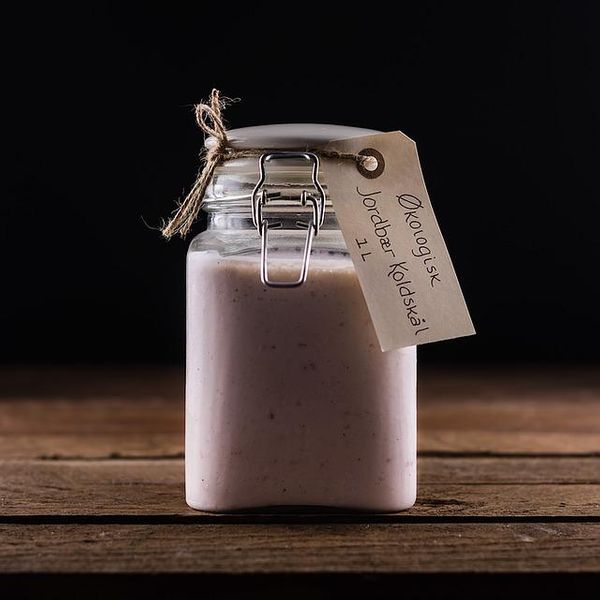What is buttermilk? Well, buttermilk, despite its name, doesn’t contain butter. Traditional buttermilk is the liquid left after churning whole milk into butter. In modern times, it’s primarily composed of casein, lactose, and water. It undergoes homogenization and pasteurization and is infused with cultures of lactic-acid generating bacteria, possibly Lactococcus lactis or Lactobacillus bulgaricus. These bacteria not only enhance its acidity but also prevent unwanted bacterial growth, prolonging buttermilk’s shelf life.
Let’s check out the various health benefits of Buttermilk
1. Buttermilk Is Easier To Digest Than Other Dairy Products
Yes, buttermilk is often easier to digest than other dairy products for some individuals. This is primarily because the lactic acid present in buttermilk can aid in the digestion of lactose, the natural sugar found in dairy. Lactose can be difficult to digest for people with lactose intolerance. The bacterial cultures in buttermilk help break down lactose, making it a more digestible option for those who might otherwise have difficulty with other dairy products. However, individual tolerance can vary, and not everyone with lactose intolerance will have the same experience with buttermilk. (Source)
2. Buttermilk Health Benefits: May Support Strong Bones
Buttermilk is a good source of calcium, a crucial mineral for bone health. Calcium is a primary component of bone structure, and consuming an adequate amount helps maintain bone density and strength. Buttermilk also contains vitamin D, which aids in the utilization of the calcium present in both the buttermilk itself and other dietary sources.
Besides, Buttermilk contains protein, which is important for overall bone health. Proteins play a role in collagen formation, a structural protein in bones, helping to maintain their integrity. Some individuals find buttermilk easier to digest compared to regular milk. This digestibility can encourage better nutrient absorption, including calcium and vitamin D, which are important for bone strength. (Source)

3. Buttermilk May Improve Oral Health
Periodontitis, a gum and teeth support structure infection, is often caused by common periodontal bacteria. Buttermilk and other fermented dairy products could offer anti-inflammatory benefits for the oral mucosa. Studies suggest that the consumption of calcium from fermented dairy foods is associated with a significantly lower incidence of periodontitis, a benefit not observed with non-dairy foods
4. Buttermilk May Help Lower Your Cholesterol Levels
A 45-gram serving of reconstituted buttermilk (buttermilk powder combined with water) per day lowered total cholesterol and triglycerides by 3% and 10%, respectively, in a short 8-week study of 34 individuals. Buttermilk sphingolipid molecules may have had this effect by preventing the gut’s absorption of cholesterol. (Source) (Source)
5. Buttermilk Lowers Blood Pressure Levels
According to some data, buttermilk may help decrease blood pressure. Buttermilk consumption lowered systolic blood pressure (the top number) by 2.6 mm Hg, mean arterial blood pressure by 1.7 mm Hg, and plasma angiotensin-I converting enzyme by 10.9% in a trial of 34 individuals with normal blood pressure when compared to a placebo.. (Source)
Plasma angiotensin-I converting enzyme helps control blood pressure by managing fluid in your body, whereas mean arterial blood pressure is the average pressure in a person’s arteries during one pulse.
Nutrition And Nutritional Value Of Buttermilk
According to the National Nutrient Database of the United States Department of Agriculture, 100g of Buttermilk has the following nutrients (USDA). (Source)

- Energy 62 kcal
- Protein 3.75 g
- Total lipid (fat) 3.33 g
- Carbohydrate, by difference 4.58 g
- Fiber, total dietary 0 g
- Sugars, total including NLEA 4.58 g
- Calcium, Ca 104 mg
- Sodium, Na 92 mg
- Vitamin C, total ascorbic acid 1 mg
- Fatty acids, total saturated 2.08 g
Side Effects of Buttermilk
Buttermilk contains a high amount of sodium, which is bad for people with kidney issues. Anyone with kidney disease should refrain from drinking it. Buttermilk may make your cold worse. Buttermilk should not be consumed at night if you have a fever, cold, or pollen allergy. In rare cases, some people may have allergies to components in buttermilk, such as milk proteins. Allergic reactions can manifest as skin rashes, hives, itching, or more severe symptoms like difficulty breathing. If you suspect a milk allergy, seek medical advice.
Besides butter milk health benefits, also explore other dairy products on Health Views Online
Also Read: Health Benefits Of Cow Milk: Nutrition and Healthy Facts





